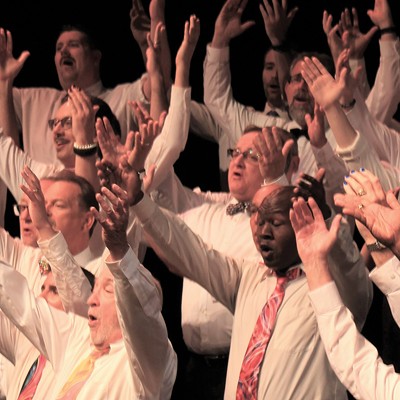The mustachioed man sitting next to me on opening night of Beowulf Alley's production of Dario Fo's We Won't Pay! We Won't Pay! was dressed in short overalls and enormous glasses. He carried a bag of groceries, from which stuck out a baguette.
Then the show began, and this man leapt to his feet, waving the bread violently in the air.
He was, of course, an actor—one of the two ensemble members (Kyle Dignoti and SaraLynn Cano) in Beowulf's production of Fo's 1974 farce.
Beowulf's show begins with an elaborate piece of slapstick, as the entire cast chases each other through the audience, waving groceries, while fast-paced music plays. It's unclear what's happening, other than that there's a shopping cart and a policeman involved.
All is explained when the main action of the play begins, and a woman, Antonia (Teresa Simone, who also choreographed the physical comedy of the play), walks onstage with several bags of groceries. She proceeds to tell her friend Margherita (Samantha Cormier) how she acquired them.
It seems that the grocery near their apartment building recently raised its prices. Most of the women who shop there, including Antonia, are the wives of factory workers, unable to pay the bills on their husbands' limited incomes. Antonia recounts how the angry women refused to pay the increased prices and instead began ransacking the shelves.
Now, Antonia has groceries galore, but she's got other problems. She's worried that her rule-following husband, Giovanni (Michael Giffords), won't approve of her theft. When Giovanni arrives home unexpectedly, loyal friend Margherita shoves some of Antonia's pilfered groceries under her dress, mimicking pregnancy.
This ruse becomes even more vital when police officers arrive and begin searching the apartment building. (Several police officers—and a few other supporting characters—are all played by actor Steve McKee. An amusing running gag is that the main cast continuously remarks on how familiar each new supporting character looks.)
Of course, when Margherita's husband, Luigi (Alan Crombie), comes home, his wife's pregnancy is a big surprise to him. And things only get more complicated from there.
Italian playwright Fo won the Nobel Prize for literature in 1997; before that, he spent nearly a half-century producing satirical theater. His shows, the most famous of which is the oft-performed Mistero Buffo, have gotten him in trouble with everyone from Italian fascist groups to the Mafia to the American government for their subversive, Communist-themed tales about working-class characters.
Fo works in the Italian commedia dell'arte tradition of physical theater that relies heavily on improvisation. Thus, he apparently encourages his translators to alter his text and his actors to improvise. Beowulf is working with a translation of We Won't Pay! by Ron Jenkins that was published in 2001, but the show is peppered with contemporary allusions regarding everything to Beowulf Alley itself to Arizona's recent cutbacks in the AHCCCS health-care program. In fact, the times when the fourth wall is broken, and the actors address the audience or make contemporary jokes, are often the best moments. One wishes there were more of them.
Director Susan Arnold and choreographer Simone lead the cast to lively, physical performances. Simone is a graduate of the Dell'Arte International School for Physical Theatre, and this background is obvious in the confidently executed slapstick scenes that pepper the show. Her Antonia is quite delightful, fully committed to each lie she tells, even as her stories grow more and more outrageous. Simone and Cormier work well together, creating a surreal, Lucy-and-Ethel-style duo—and they do so while keeping bags of rice and pasta under their clothes.
However, though the setup is extremely funny, the show is nearly 2 1/2 hours long, which is a brutal stretch of time to keep up such an over-the-top pace and maintain an audience's interest. Given how free the company was allowed to be with the source material, one wonders why it wasn't cut more radically. Do we really need every elaborate sight gag and misunderstanding?
Another odd choice: The four main actors talk in exaggeratedly comic Italian accents. If the characters are Italian, why do they even have accents? Italian doesn't sound like accented English to other Italians. And the world of the play is never specified as Italian by the dialogue of the play itself—no mention is ever made of a specific place or time, other than deliberately anachronistic contemporary references. The world of Fo's play is too broadly drawn to be rooted in one time or place, making the accents particularly unnecessary.
The set (designed by Sheldon Metz) is a one-room working-class apartment done up in realistic detail. Then, in a nice touch, the apartment complex beyond the stage is suggested by chalk sketches on the wall, a neat visual metaphor for the "sketched-in" feeling of the world beyond Antonia and Giovanni's apartment. These outlines remind us that we are in an abstract world—a world that might be amusing, but is designed to make a point.
This is confirmed at the play's end, when the four main cast members drop their accents to announce to the audience the moral of the play: Desperation is a potent force that can be harnessed for political change.
It's a worthy and timely point, certainly, but I found myself begrudging the lengthy amount of time it took to get there.









